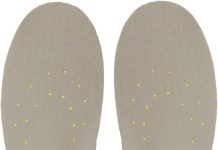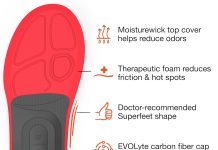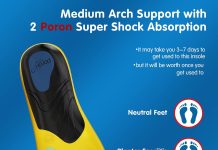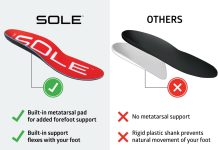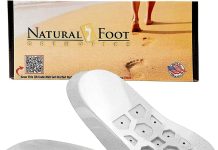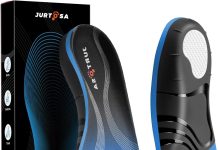Are you looking for the perfect insoles to enhance your running experience? Look no further! This article comprehensively lists the ten best insoles designed to support and cushion your feet while pounding the pavement.
With options ranging from gel inserts to memory foam, we’ve done the research to ensure you find the perfect fit for your running shoes.
Whether you’re a seasoned marathoner or just starting, these top-notch insoles will provide you with the comfort and stability you need to reach your running goals. Say goodbye to discomfort and hello to a smoother, more enjoyable run!
This image is the property of static.independent.co.uk.
What are insoles?
Insoles, or shoe inserts or footbeds, are specialized accessories placed inside shoes to provide additional comfort, support, and cushioning. They are designed to improve the fit of shoes, absorb shock, and alleviate various foot-related problems.
Insoles can benefit all types of footwear, but they are essential for running shoes, which undergo significant impact and stress during physical activity. By using the right insoles, runners can enhance their overall comfort, prevent injuries, and improve their performance on the track or trail.
Definition and purpose of insoles
Insoles can be defined as removable footbeds that are placed inside shoes to provide extra support, cushioning, and comfort. They are primarily designed to enhance the shock-absorbing properties of shoes and improve the fit and alignment of the foot.
Insoles can help alleviate foot pain, correct abnormalities, and prevent injuries. They come in various shapes, sizes, and materials, allowing runners to find the perfect fit for their unique needs.
Benefits of using insoles for running
Using insoles in running shoes offers a wide range of benefits for runners. Here are some of the key advantages:
- Improved cushioning: Insoles are designed to provide extra cushioning and shock absorption, reducing the impact on the feet during running. This can help prevent foot fatigue, discomfort, and injuries.
- Enhanced support: Insoles provide additional support to the arches and heels of the feet, promoting proper foot alignment and reducing excessive pronation or supination. This can alleviate common issues such as plantar fasciitis, shin splints, and knee pain.
- Reduced risk of injuries: The added support and cushioning provided by insoles can help reduce the risk of common running injuries, such as stress fractures, Achilles tendinitis, and a runner’s knee. By absorbing shock and distributing pressure more evenly, insoles help protect the foot and lower limb from overuse and impact-related injuries.
- Customized fit: Insoles can be customized to fit the unique shape of an individual’s foot, providing a personalized level of support and comfort. They can help address specific foot conditions, such as high arches, flat feet, or plantar fasciitis, offering relief and stability.
- Improved performance: By optimizing foot alignment, reducing fatigue, and minimizing discomfort, insoles can enhance running performance. Runners can maintain a more efficient gait, promoting better posture and stride mechanics and improving speed and endurance.
Factors to consider when choosing insoles
When selecting insoles for running shoes, there are several important factors to consider. These factors influence the insoles’ overall comfort, support, and effectiveness. Here are the key factors to keep in mind:
Arch type
Insoles come in different options for different arch types: low, medium, and high. It is crucial to identify your arch type to choose the appropriate insoles. High-arched individuals may require more support, while low-arched individuals may need more cushioning.
Cushioning
The level and type of cushioning provided by the insoles should be considered. Some runners prefer softer cushioning, while others may prefer firmer support. The cushioning should be sufficient to absorb shock and provide comfort during long runs.
Shock absorption
Good shock absorption is essential for running, reducing the impact on the feet, knees, and joints. Look for insoles with excellent shock absorption properties to prevent injuries and minimize discomfort.
Materials used
The materials used to construct insoles can affect their durability, breathability, and overall performance. Common materials include foam, gel, memory foam, carbon fiber, and various synthetic fabrics. Consider your personal preferences and requirements when choosing the suitable material.
Breathability
Runners sweat during workouts, and excessive moisture can lead to discomfort and foot odor. Opt for insoles that have breathability features, such as moisture-wicking properties, to keep your feet dry and comfortable.
Thickness and size
Insoles come in different thicknesses; selecting the appropriate thickness is essential for proper shoe fit and support. Additionally, ensure that the insoles match your shoes’ size for a proper fit.
Support and stability
Insoles should provide adequate support and stability for your feet. Look for features like arch support and heel cups to promote proper foot alignment and prevent overpronation or supination.
Durability
Consider the durability of the insoles, especially if you are a frequent runner. Durable materials and sturdy construction will ensure that the insoles meet the demands of regular running.
Price
Insoles are available at various prices, depending on the brand, materials, and features. Set a budget that suits your needs and consider the value and quality offered by different insoles within that price range.
Reviews and recommendations
Researching and reading reviews and recommendations from other runners can provide valuable insights. Pay attention to feedback from individuals with similar foot conditions or running styles to find insoles well-suited to your specific needs.
This image is the property of cdn.thewirecutter.com.
Types of insoles for running
Various insoles are available for running shoes, each designed to address different foot issues and provide specific benefits. Here are some commonly used types of insoles:
Orthotic insoles
Orthotic insoles are designed to correct foot alignment issues and alleviate pain caused by conditions like plantar fasciitis, flat feet, or overpronation. They provide customized support and stability to the foot arch and promote proper foot positioning during running.
Cushioning insoles
Cushioning insoles are primarily focused on providing comfort and shock absorption. They are constructed with materials like foam or gel, aiming to reduce the impact of each step and enhance overall running comfort.
Arch support insoles
Arch support insoles are designed to support the foot’s arch. They help maintain proper foot alignment, reduce stress on the arch, and prevent conditions such as plantar fasciitis and arch fatigue.
Heat-moldable insoles
Heat-moldable insoles can be customized to the shape of an individual’s foot by heating them and allowing them to mold to the foot contours. This customization ensures a comfortable fit and tailored support.
Gel insoles
Gel insoles utilize gel materials to provide superior cushioning and shock absorption. They are ideal for runners who require maximum comfort and impact protection.
Memory foam insoles
Memory foam insoles contour to the foot’s shape, providing personalized support and cushioning. They offer excellent pressure distribution and can alleviate discomfort associated with certain foot conditions.
Carbon fiber insoles
Carbon fiber insoles are lightweight and offer excellent support and stability. They help control excessive foot movements and prevent overpronation or supination, reducing strain on the feet and lower limbs.
Full-length insoles
Full-length insoles extend from heel to toe, providing support and cushioning to the entire foot. They are ideal for runners who require comprehensive foot support and alignment correction.
3/4-length insoles
3/4-length insoles cover the heel and arch area, leaving the toes free. They are suitable for runners who prefer a balance between support and freedom of movement.
Trim-to-fit insoles
Trim-to-fit insoles can be customized to fit your shoes’ size and shape. They have marked guidelines, allowing runners to cut them to the desired size for a perfect fit.
Ten best insoles for running
Choosing the right insoles for running can be overwhelming, given the numerous options available. To help you make an informed decision, here are ten highly recommended insoles for running:
Superfeet Green Premium Insoles
Superfeet Green Premium Insoles are known for their excellent arch support and stability. These insoles are made with high-density foam, provide maximum shock absorption, and help prevent common running injuries.
Powerstep Pinnacle Maxx Full-Length Orthotic Insoles
Powerstep Pinnacle Maxx Full-Length Orthotic Insoles offer exceptional cushioning and support. They feature a semi-rigid arch support that helps stabilize the foot and enhance overall comfort.
Sof Sole Airr Orthotic Performance Insoles
Sof Sole Airr Orthotic Performance Insoles combine cushioning with breathability. These insoles feature gel cushioning in the heel and forefoot, providing superior shock absorption and comfort.
Dr. Scholl’s SPORT Insoles
Dr. Scholl’s SPORT Insoles are designed for active individuals. They provide cushioning and support, focusing on reducing foot fatigue and preventing foot odor.
Spenco Polysorb Cross Trainer Insoles
Spenco Polysorb Cross Trainer Insoles offer a combination of cushioning and arch support. They have a contoured shape that helps stabilize the foot and reduce overpronation during running.
Physix Gear Sport Full-Length Orthotic Inserts
Physix Gear Sport Full Length Orthotic Inserts provide firm arch support and targeted cushioning. They help align the feet and optimize gait mechanics for improved running performance.
New Balance Insoles 3810 Ultra Support Insoles
New Balance Insoles 3810 Ultra Support Insoles are designed for runners seeking maximum support. These insoles feature a deep heel cup and a high arch for enhanced stability and comfort.
Sof Sole Athlete Performance Insoles
Sof Sole Athlete Performance Insoles are ideal for runners who enjoy intense physical activity. They provide excellent cushioning and shock absorption, keeping feet comfortable and protected.
ProFoot Plantar Fasciitis Insoles
ProFoot Plantar Fasciitis Insoles are designed to alleviate the pain associated with plantar fasciitis. They provide targeted support to the arch and heel, reducing strain on the plantar fascia.
WalkFit Platinum Foot Orthotics
WalkFit Platinum Foot Orthotics offers customizable support and cushioning. They come with three different arch inserts to accommodate various foot types and provide the desired level of support.
This image is the property of u7q2x7c9.stackpathcdn.com.
Insole care and maintenance
Proper care and maintenance are essential to ensure the longevity and effectiveness of your insoles. Here are some tips on how to take care of your insoles:
Cleaning and deodorizing
Regularly clean your insoles with warm water and mild soap. Gently scrub the insoles and rinse thoroughly before allowing them to air dry. Use baking soda or an antibacterial spray designed explicitly for insoles to control odor.
Replacing insoles
Insoles must be replaced periodically, as they will wear out over time. The replacement frequency depends on material quality, usage, and personal comfort preferences. It is recommended to replace insoles every six to twelve months or when signs of wear become apparent.
Storage Tips
Store your insoles in a cool and dry place to prevent moisture buildup and mold growth when not in use. Keep them away from direct sunlight or heat sources to avoid warping or damage.
How to choose the right insoles for your feet
Choosing the right insoles for your feet involves considering various factors and understanding your needs. Here are some steps to help you make the right decision:
Consulting a medical professional
If you have any existing foot conditions or concerns, it is advisable to consult a medical professional such as a podiatrist or orthopedic specialist. They can assess your foot type, recommend specific insoles, and provide valuable guidance.
Understanding your foot type
Determining your foot type is crucial in selecting the right insoles. Assess whether you have high, low, or neutral arches. This information will help guide you toward insoles that offer appropriate support and cushioning.
Trying different types of insoles
Experimenting with different types of insoles can help you find the most comfortable and practical option for your feet. Try various materials, thicknesses, and support levels to determine which insoles work best.
Considering your specific needs and preferences
Consider your running style, duration, and intensity when selecting insoles. If you have foot conditions like plantar fasciitis or overpronation, choose insoles specifically targeting those issues. Additionally, consider your personal comfort preferences and any feedback from previous running experiences.
This image is the property of www.stylecraze.com.
Frequently asked questions about insoles for running
Here are some common questions that runners often have about using insoles for running:
Do I need to replace my insoles often?
Yes, insoles need to be replaced periodically. The exact timeframe depends on factors such as usage frequency, intensity, and the quality of the insoles. Regular inspection for wear and discomfort is recommended to determine when replacement is necessary.
Can insoles fix foot problems?
While insoles can provide temporary relief and support, they may not fix underlying foot problems. Consulting a medical professional is essential for correctly diagnosing and treating foot conditions.
Are insoles suitable for all types of running shoes?
Most insoles are designed to be versatile and can fit various types of running shoes. However, it is essential to consider the shoe’s size, shape, and the compatibility of the insole with your specific shoe style.
How long does it take to get used to new insoles?
The adjustment period for new insoles varies for each individual. It may take a few runs or a couple of weeks to fully adapt to the feel and support provided by the insoles.
Can insoles prevent injuries?
Insoles can help prevent injuries by providing additional support, cushioning, and alignment correction. However, it is essential to note that insoles alone may not guarantee injury prevention. Proper running technique, adequate training, and appropriate footwear are crucial.
Can insoles improve running performance?
Well-fitted and supportive insoles can enhance running performance by improving foot alignment, reducing fatigue, and providing optimal cushioning and shock absorption. However, individual results may vary.
Do insoles work for flat feet?
Insoles can provide support and alleviate discomfort associated with flat feet. Look for insoles with arch support and stability to encourage proper foot alignment.
Can I trim the insoles to fit my shoes?
Many insoles come with trim-to-fit guidelines, allowing users to customize the size and shape to match their shoes. Follow the guidelines provided by the manufacturer to ensure a proper fit.
Do insoles work for high arches?
Insoles with adequate arch support can be beneficial for individuals with high arches. Look for insoles that offer cushioning and support to help reduce excessive pressure on the arch.
Are custom-made insoles worth the investment?
Custom-made insoles, created with the help of a podiatrist or orthopedic specialist, provide the highest level of personalization and support. They are recommended for individuals with unique foot conditions or specific requirements but can be more expensive than off-the-shelf options.
Conclusion
Insoles play a significant role in providing runners comfort, support, and cushioning. Choosing the right insoles for your specific needs can enhance your running experience, reduce the risk of injuries, and improve your performance.
Whether you prefer orthotic insoles for corrective support, cushioning insoles for comfort, or other specialized options, a wide range of insoles are available to cater to every runner’s requirements.
Consider the factors discussed in this article, explore different types of insoles, and consult a medical professional if needed to find the perfect pair of insoles for your running shoes.
So, lace up your shoes, slip in your insoles, and hit the road with added comfort and confidence!
This image is the property of www.shape.com.
References
- Runner’s World: The Truth About Insoles for Your Running Shoes
- Podiatry Today: The Surprising Potential Of Insoles
- Verywell Fit: What Runners Should Know About Arch Support
- OrthoFeet: Insoles for Running Shoes: What You Should Know
Dr. Scholl's Run Active Comfort Insoles, Men's, 1 Pair, Trim to Fit Inserts
CURREX RUNPRO - Professional Running Insole, Added Cushioning, Flexible Support, Increased Performance, Thin Shoe Inserts for Athletic, Comfort & Walking Shoes, Men and Women
Insoles for Men and Women- Support Shock Absorption Cushioning Sports Comfort Inserts, Breathable Shoe Inner Soles for Running Walking,Hiking,Working
Sof Sole mens Athlete Performance Full-length Insole, Orange, Men s 11-12.5 US
$24.99 in stock

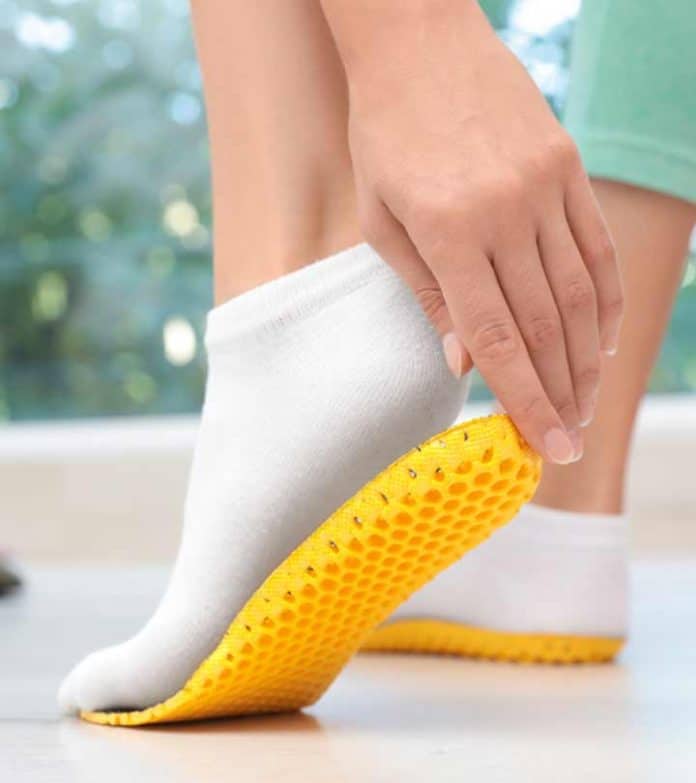
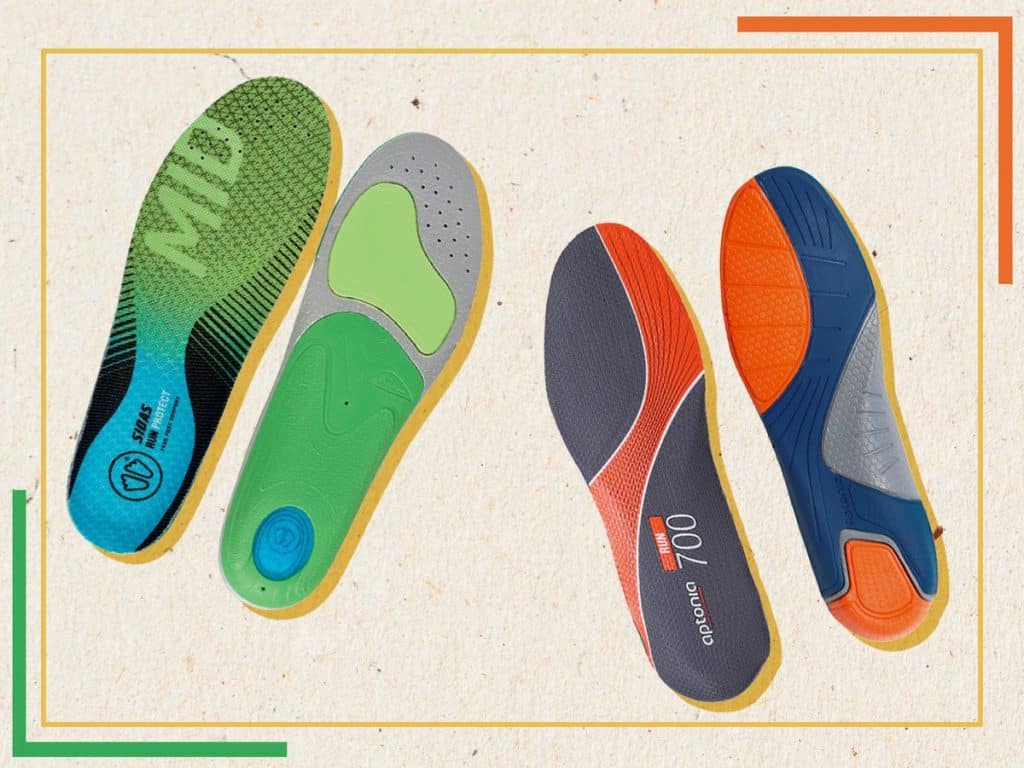
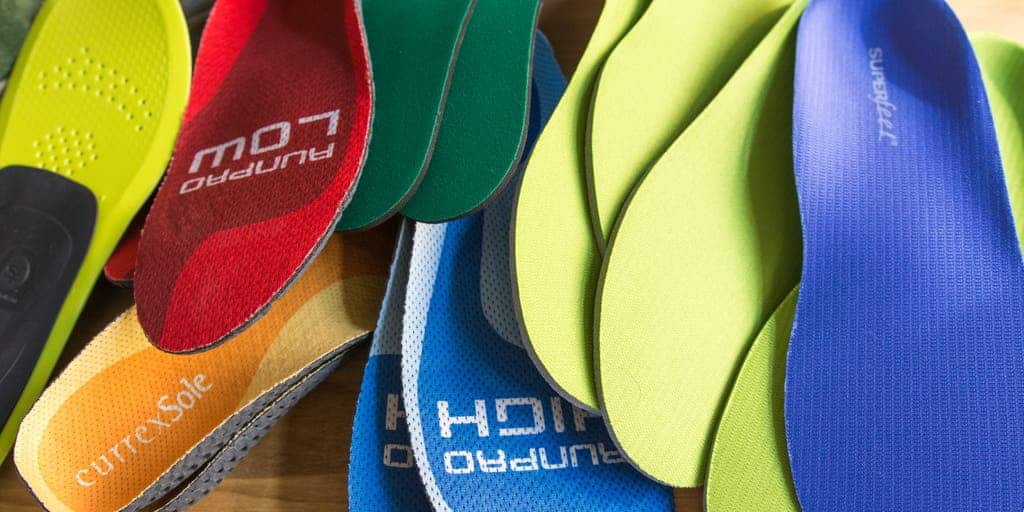

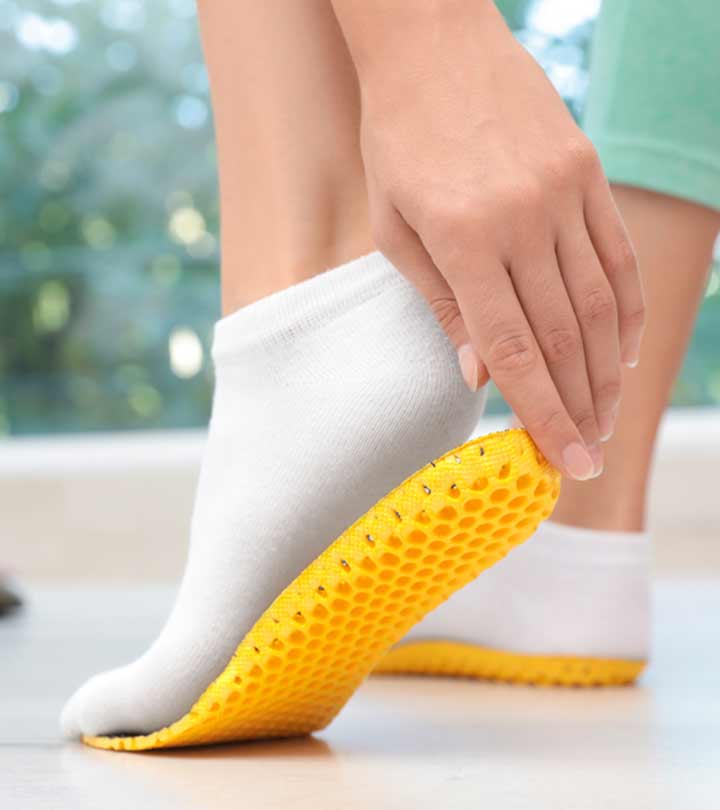





![10 Best Insoles for Running | Insoles FeelLife Plantar Fasciitis Relief Shoe Insoles [1-Pair], Arch Support Insoles, Running Athletic Gel Shoe Inserts, Orthotic Insoles for Arch Pain [Trim to Fit: Men 8-11/Women 9-12]](https://m.media-amazon.com/images/I/41wenlYrkjL._SS520_.jpg)






